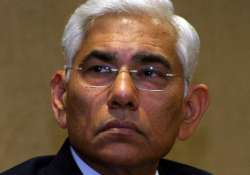CAG Objects To JPC Members Charge On 'Batting For Corporates'
New Delhi, Dec 20: Comptroller and Auditor General Vinod Rai today strongly objected to the charge of a member of the Joint Parliamentary Committee on 2G that the top auditor was “batting for selective corporate

New Delhi, Dec 20: Comptroller and Auditor General Vinod Rai today strongly objected to the charge of a member of the Joint Parliamentary Committee on 2G that the top auditor was “batting for selective corporate interests” while examining the controversial spectrum allocation.
Appearing before the JPC for the second consecutive day, Rai also fended off criticism of his methods of calculating the presumptive loss insisting that the wildcat offer made by S-Tel and FDI attracted by telecom operators after being allocated spectrum were indicators of market trends.
Questioned by members of a Joint Parliamentary Committee examining the telecom policies of the government, the Comptroller and Auditor General Vinod Rai said that the offer made by S-Tel, which was subsequently found ineligible, was the only indicator of market trend for spectrum allocation.
Rai also objected to a Congress member's claims that he was “batting for selective corporate interests” while pursuing the audit and insisted that “it was unfair to say this”.
Addressing a press conference later, JPC Chairman P C Chacko said that the Committee did not share the view of the member.
Chacko said Rai was also asked the basis for calculating the presumptive loss as members felt that the Income Tax Act had no provisions for such computation as contended by the CAG before the Committee.
The members said that the CBDT Chairman had told the JPC that there was no practice or legal authority to calculate presumptive loss and the provisions in the IT Act Section 44 (E & D) were entirely in a different context.
Rai conceded that he had taken the presumptive loss in a generic sense and not as a specific case used to calculate tax liability of small contractors as per some financial legislation.
On calculating the loss based on the FDI attracted by some companies who were allocated 2G spectrum, Rai told the Committee that the foreign investment was an indicator of the price at which the equity was sold.
There was no inappropriateness in taking indicative figures, the CAG maintained.
The next meeting of the JPC will be held on January 11 when Finance Secretary R S Gujral and Economic Affairs Secretary R Gopalan are expected to appear to clarify on the non-submission of a finance ministry note to the JPC.
Meanwhile, Chacko is understood to have made it clear to members that he was not keen to seek another extension for the JPC beyond the Budget Session next year.
From January, the JPC will have two sittings every week, Chacko said, adding that he would submit a report to Parliament one day before the end of the Budget Session in May next year.
Chacko is believed to be keen to prepare a draft report by April which could be debated and adopted in the next couple of weeks.
The JPC, consisting of 20 members from Lok Sabha and 10 from Rajya Sabha, was constituted on March 4 to look into the entire gamut of policy prescriptions in the telecom sector from 1998 to 2009.